You may hear about certified translation and notarized translation when dealing with administrative procedures in both your area and foreign countries. The confusion over certified vs. notarized translation can waste your time and money. In this article, we will give you simple explanations of the differences between Certified translation and notarized translation.
Certified translation is a translation that is companied by a signed statement of the translator or the translation agency. This statement is called Certificate of Translation Accuracy or Affidavit which verifies the accuracy and completeness of the translation.
However, requirements for certified translations are different from country to country. For example, in the US, translators don’t have to be sworn in to provide certified translations. On the other hand, in Spain or Italy, you can only get a certified translation from a sworn translator.
A notarized translation is a certified translation that comes with an official seal of a Notary Public. Notarization is generally conducted with the same procedure in different countries.
According to the above definitions, you can see that notarization is an additional layer of assurance to the certified translation. We will delve into the details of differences between certified and notarized translation through 4 categories as follows.
Certified translations can be provided by a translation company or a translator. Meanwhile, notarized translations can only be issued by a Notary Public, who is authorized by the government. It’s important to bear in mind that the Notary only verifies the identity of the translator, not the translation quality.
It’s also worth noting that the competent parties in certified translation and notarized translation are stipulated differently throughout the world.
For example, in France, a certified translation can only be performed by a sworn translator who has special authorization from a Foreign Office to translate official documents. This type of certified translation does not require notarization to be legally used in France.
In most countries, including Vietnam, you can get certified translation from a translation agency. After that, your translations can be notarized at the Justice Department and authenticated by the Ministry of Foreign Affairs, if necessary.
Not sure which type of certification you need for your translation? Check out our article about Certificate of Translation Accuracy before you order any certified translation service!
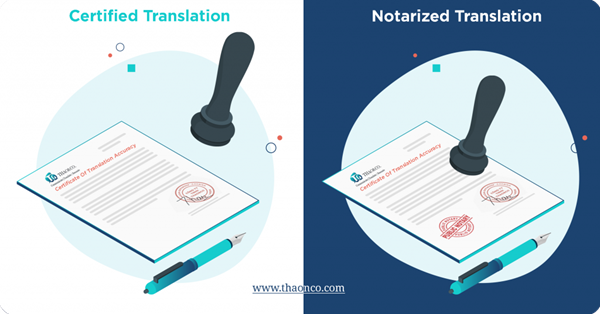
When you submit your documentation to foreign governments or institutions, most documents require certified translations. On the other hand, legal and official documents such as civil documents and business documents may require notarized translations.
For example, certified translations are typically required for the following documents:
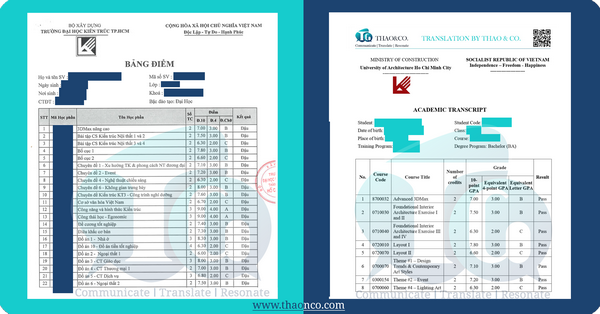
Notarized translations are typically required for the following documents:
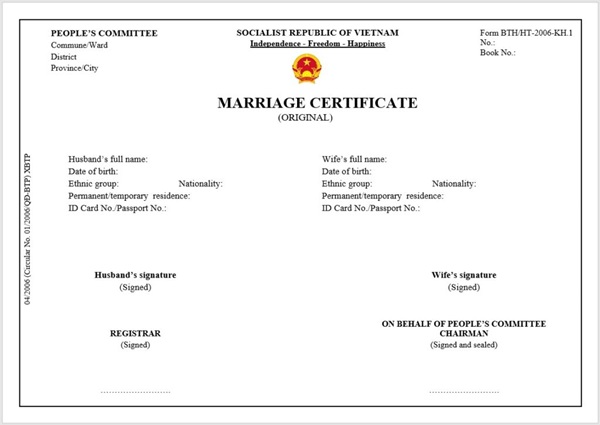
As mentioned, for most cases, notarization doesn’t attest to the accuracy and quality of the translation. Therefore, many organizations go back to the certified translation system. You should find out beforehand the specific requirements of the destination offices or institutions.
For most cases, a certified translation is not recognized with full legal effect in a country until it is notarized. Notarization is the involvement of the government as a third party in the certified translation. Besides, your translation often has to be certified before applying for notary approval.
A notarized translation is only valid within the issuing country. If you need to use your documents in another country, you may have to get consular authentication for the translations. In addition to that, notarization is compulsory in advance of the consular authentication.
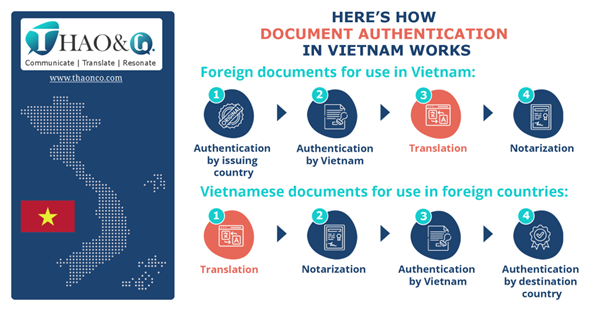
Some agencies price certified translation higher than regular translation. The certified translation cost also depends on other factors such as the length of the document, language combination, urgency, etc. Notarization requires an additional fee along with the certified translation cost, and this fee primarily depends on the number of pages.
Many translation agencies, including Thao & Co., provide notarization as a supporting service. If you don’t have time for such a cumbersome and time-consuming process, it’s best to choose such agencies to help you deal with these procedures.
However, a quality translation should be your top priority over the price when hiring a translation service. Thao & Co. offers certified and notarized translation services performed by professional native linguists. With extensive expertise in certified translation, our linguists and specialists will help you out in one fast and convenient process.
Head over to our Get A Quote page and connect with our consultants!
Although you can spot the differences, it’s not enough to tell whether a certified translation or a notarized translation is required in each situation. The best way is to check the particular requirements of the receiving institutions or government bodies.
Still, there are some other ways to evaluate the requirements based on common situations. Most of the time, certified translation is requested when translation quality is the primary condition, or the documents are issued by a government body. Notarization is required for legal purposes such as applying for a work permit, seeking immigration, registering a business license, etc.
Need help with certified translation and notarized translation? Our professionals will help you out!
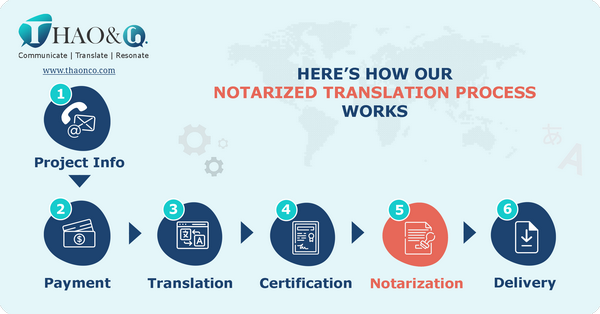
Thao & Co. provides high-quality translations performed by experienced native linguists to meet your every need. We also offer certification, notarization, and Consular authentication as our supporting services to give you the best experience:
For further information, please don’t hesitate to contact us on our Get A Quote page or our hotline at (+84) 396 773 374!